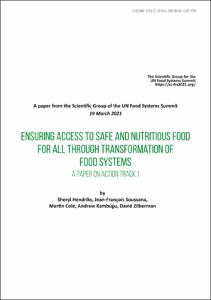Ensuring Access to Safe and Nutritious Food for All Through Transformation of Food SystemsA paper on Action Track 1

Ensuring Access to Safe and Nutritious Food for All Through Transformation of Food Systems
A paper on Action Track 1

| dc.contributor.author | Hendriks, Sheryl | |
| dc.contributor.author | Soussana, Jean-François | |
| dc.contributor.author | Martin, Cole | |
| dc.contributor.author | Kambugu, Andrew | |
| dc.contributor.author | Zilberman, David | |
| dc.date.accessioned | 2021-05-21T09:08:24Z | |
| dc.date.available | 2021-05-21T09:08:24Z | |
| dc.date.issued | 19.03.2021 | |
| dc.identifier.uri | https://hdl.handle.net/20.500.11811/9098 | |
| dc.description.abstract | Action Track 1 of the Food Systems Summit offers an opportunity to bring together the crucial elements of food safety, nutrition, poverty and inequalities in the framework of food systems in the context of climate and environmental change to ensure that all people have access to a safe and nutritious diet. Achieving Action Track 1 goal is essential to the achievement of the goals of the other Action Tracks. With less than a decade left to achieve the Sustainable Development Goals (SGD), most countries are not on target to achieve the World Health Organisation’s nutrition targets and SGD 2 targets. The COVID pandemic has exacerbated malnutrition and highlighted the need for food safety. The pandemic has also exposed the deep inequalities in society and food systems. Yet, future food systems can address many of these failings and ensure safe and nutritious food for all. However, structural change is necessary to address the socio-economic drivers behind malnutrition, inequalities and the climate and environmental impacts of food. Adopting a whole-system approach in policy, research and monitoring and evaluation is crucial to manage trade-off and externalities from farm-level to national scales and across multiple sectors and agencies. Supply chain failures will need to be overcome and technology solutions adopted and adapted to specific contexts. A transformation of food systems requires coordinating changes in supply and demand in differentiated ways across world regions: bridging yield gaps and improving livestock feed conversion, largely through agro-ecological practices, deploying at scale soil carbon sequestration and greenhouse gas mitigation, reducing food losses and wastes, as well as over-nourishment and shifting the diets of wealthy populations. Global food systems sustainability also requires halting the expansion of agriculture into fragile ecosystems, while restoring degraded forests, fisheries, rangelands, peatlands and wetlands. Shifting to more sustainable consumption and production patterns within planetary boundaries will require efforts to influence food demand and diets, diversify food systems, careful land-use planning and management. Integrative policies need to ensure that food prices reflect real costs (including major externalities caused by climate change, land degradation and biodiversity loss, and public health impacts of malnutrition), reduce food waste and, at the same time, ensure safe and healthy food affordability, decent incomes and wages for farmers and food system workers. Harnessing science and technology solutions and sharing actionable knowledge with all players in the food system offers many opportunities. Greater coordination of food system stakeholders is crucial for greater inclusion, greater transparency and more accountability. Sharing lessons and experiences will foster adaptive learning and responsive actions. Careful consideration of the trade-offs, externalities and costs of not acting is needed to ensure that the changes we make benefit to all and especially the most vulnerable in society. | en |
| dc.format.extent | 24 | |
| dc.language.iso | eng | |
| dc.rights | In Copyright | |
| dc.rights.uri | http://rightsstatements.org/vocab/InC/1.0/ | |
| dc.subject | Food systems | |
| dc.subject | Nutrition | |
| dc.subject | Poverty | |
| dc.subject | Food safety | |
| dc.subject.ddc | 300 Sozialwissenschaften, Soziologie, Anthropologie | |
| dc.subject.ddc | 630 Landwirtschaft, Veterinärmedizin | |
| dc.title | Ensuring Access to Safe and Nutritious Food for All Through Transformation of Food Systems | |
| dc.title.alternative | A paper on Action Track 1 | |
| dc.type | Arbeitspapier | |
| dc.identifier.doi | https://doi.org/10.48565/scfss2021-wg92 | |
| dc.publisher.name | Center for Development Research (ZEF) in cooperation with the Scientific Group for the UN Food System Summit 2021 | |
| dc.publisher.location | Bonn | |
| dc.rights.accessRights | openAccess | |
| dc.relation.url | https://sc-fss2021.org/wp-content/uploads/2021/04/Action_Track_1_paper_Ensuring_Access.pdf | |
| ulbbn.pubtype | Zweitveröffentlichung | |
| dc.version | updatedVersion |
Dateien zu dieser Ressource
Das Dokument erscheint in:
-
Scientific Group Reports (8)
These papers are shared to provide information and facilitate discussion for transparent and evidence-based Summit preparations.




